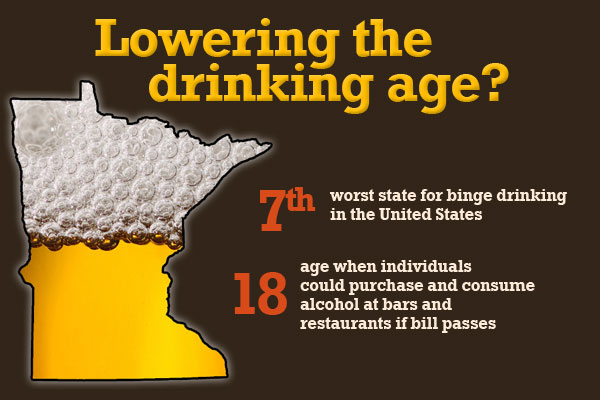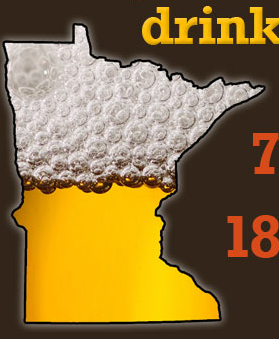
On Jan. 30, Rep. Phyllis Kahn, DFL- Minneapolis, proposed a bill that would lower the legal drinking age in Minnesota to 18 years old. The bill, however, would only allow 18-year-olds to purchase and consume alcohol in bars and restaurants, restricting them from purchasing alcohol from liquor stores.
Not only would this bill affect college-aged students, but it would also allow 16- and 17-year-olds to consume alcohol at bars and restaurants with a parent or guardian.
Kahn brought this bill to the House of Representatives multiple times, but it has yet to be passed.
A recent study from the United Health Foundation showed that Minnesota is the seventh worst state for binge drinking. Kahn said that she believes the high rate of binge drinking is a result of the current drinking age.
However, Minnesota House Majority Leader Matt Dean said he is not convinced that is the case.
“Legalizing it would not make the problem better,” Dean said.
Dean also said that not only does Minnesota have one of the worst binge drinking rates in the nation, it also has one of the highest teen traffic fatality rates.
He said that he thinks lowering the drinking age would make the problem even worse.
“It would go from bad to worse in these areas,” Dean said.
Students like sophomore Jeff Rada said that they recognize the advantages of this bill, such as boosting the state’s economy and helping the bars and restaurants that have been affected as a result of the smoking ban in 2007. However, Rada said that he believes lowering the drinking age is not the answer.
“Your brain isn’t fully developed at 18,” Rada said. “In terms of alcoholism, I definitely think it would grow.”
The National Minimum Drinking Act of 1984 requires states to comply with a minimum drinking age of 21. This means that if the drinking age was lowered, the 10 percent of federal funds given to Minnesota each year for highway maintenance could be at risk.
Dean said that he acknowledges these economic stand points, however, he believes the real issue with this bill is the well-being of “our young people.”
“From a public health point, I would oppose the bill,” Dean said.
Mike Barrett, associate director of Public Safety, said that no matter what age students can drink, they are still responsible for their behavior.
Barrett also said he envisions a difficult interim period if the law is passed.
“It would eventually stabilize, and we would see the same amount of alcohol-related incidents we see now,” Barrett said. “The vast majority of our students choose socially responsible behavior.”
Freshman Keeley Norton said that she also sees the initial implementation of the bill as a problem.
“I think that right away, it would definitely be a huge problem,” Norton said. “In America, it’s such a ritual to hit your 21st birthday and go out to the bar with all your friends and have your first legal drink. If they lowered the drinking age, I feel like that ritual would come so much sooner in everyone’s life and that could pose more problems.”
The bill has been read and referred to the Committee on Commerce and Regulatory Reform.
“We can only hope that legislatures will do what is truly best for the health of our youth and our communities,” Norton said.
Meghan Sheldon can be reached at shel9069@stthomas.edu.


If people think those that are younger than 21 aren’t consuming alcohol, they are tragically blind. So while I can understand the “brain development” argument for 18-year olds, the fact is that many of them still consume, especially within the “college culture.” So why not lower that “legal age,” boost tax revenue, and boost the economy of bars and restuarants? To further question Rada’s “brain development” argument, you feel okay that someone who is 18 (and even much younger) can be charged as an adult in a federal court and face life-sentences in prison, or that they can enlist in the U.S. military, or be drafted into the military should it arise, but that they can’t go out and have a beer with their meal at a Buffalo Wild Wings? Makes a lot of sense to me. “Please, don’t serve me a beer, my brain isn’t fully developed, but hand me an automatic rifle and train me on how to kill…”
I’m all in favor of reducing the drinking age in Minnesota, but it’s not going to happen unless the federal government repeals the National Minimum Drinking Age Act of 1984 that cajoled states to the decision to concede to the new drinking age or lose up to ten percent of their federal highway funding.